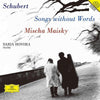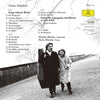



Schubert - Songs without Words - Mischa Maisky (2LP, DMM)
Franz Schubert — Songs without Words & Sonata for Arpeggione and Piano in A Minor, D.821
Mischa Maisky - cello
Daria Hovora - piano
2 LP, Gatefold
Original analog Master tape : YES
Direct Metal Mastering (DMM)
Heavy Press : 180g
Record color : black
Speed : 33 RPM
Size : 12'’
Stereo
Emil Berliner Studio
Record Press : Pallas GmbH in Germany
Label : Analog Phonic
Original Label : Deutsche Grammophon
First time ever on vinyl records
Recorded in Rapperswil, Schloß, Rittersaal, 1/1996
Engineered by Reinhard Legemann
Produced by Christian Gansch
Balance Enginner & Editing : Oliver Rogalla
Remastered by Hans-Jörg Mauksch at Pauler Acoustics from the original masters of Universal Music
Originally released in 1996
Reissued in 2017
Tracks:
Side A : Songs without Words
- Die Chöne Müllerin, D.795 - 6. Der Neugierige
- Nur Wer Die Sehnsucht Kennt, D.877 No.4 (Mignons Gesang, 4th Version)
- Winterreise, D.911 - 19. Täuschung
- Winterreise, D.911 - 24. Der Leiermann
- Nacht Und Träume, D.827
- Schwanengesang, D.957 (Cycle) - Am Meer
Side B : Songs without Words
- An Die Musik, D.547 (Op.88/4)
- Die Forelle, D.550 (Op.32)
- Schwanengesang, D.957 - Ständchen "Leise Flehen Meine Lieder
- Der Einsame, D.800
- Die Schöne Müllerin, D.795 - 19. Der Müller Und Der Bach
- Heidenröslein, D. 257 (Op.3/3)
Side C :
- Songs without Words - Litanei Auf Das Fest Allerseelen, D.343
- Songs without Words - Du Bist Die Ruh', D.776 (Op.59/3)
- Sonata For Arpeggione And Piano In A Minor, D.821 - Allegro Moderato
Side D : Sonata For Arpeggione And Piano In A Minor, D.821
- Adagio
- Allegretto
Reviews :
« Here cellist Mischa Maisky and pianist Daria Hovora turn in a beautiful version of Schubert’s songful Arpeggione Sonata, as well as instrumental takes on some of the composer’s most beloved lieder. Music doesn’t get any more intimate or heartbreaking than“Ständchen” or “Der Müller Und Der Bach”, and it’s hard to imagine any voice more emotionally eloquent than Mischa Maisky’s plangent tone. » Billboard
« ...Maisky's Arpeggione is warm, effortless and, for the most part, judiciously phrased. Darla Hovora remains discreetly in the background (as a musical personality, that is, not as a physical presence) and although I found some of the Allegretto's rubato just a mite contrived, the performance is a good one...
...Maisky makes a lovely sound, especially in, say, An die Musik, where the cello's upper registers project with great warmth of tone... » (Gramophone)
Direct Metal Mastering
In Direct Metal Mastering, the cutting lathe engraves the audio signal directly onto a copper-plated master disc, instead of engraving the groove into a lacquer-coated aluminum disc.
The direct metal mastering technology addresses the lacquer mastering technology's issue of pre-echoes during record play, caused by the cutting stylus unintentionally transferring some of the subsequent groove wall's impulse signal into the previous groove wall. In particular, a quiet passage followed by a loud sound often clearly revealed a faint pre-echo of the loud sound occurring 1.8 seconds ahead of time (the duration of one revolution at 33 rpm). This problem could also appear as post-echo, 1.8 seconds after a peak in volume.
Another improvement is noise reduction. The lacquer mastering method bears a higher risk of adding unwanted random noise to the recording, caused by the enclosure of small dust particles when spraying the silvering on the lacquer master, which is the necessary first step of the electroplating process for reproduction of the master disc. As the DMM master disc is already made of metal (copper), this step is not required, and its faults are avoided.
With the groove being cut straight into a metal foil, this removed a number of plating stages in the manufacturing process. This gave rise to more upper frequency levels and less surface noise. Additionally, groove pre-echo problems are significantly diminished. Bass is typically tight and well defined, even described as more accurate than the fat, mushy sound of lacquered vinyl pressings.
Ratings :
AllMusic : 5 / 5 , Discogs : 5 / 5

